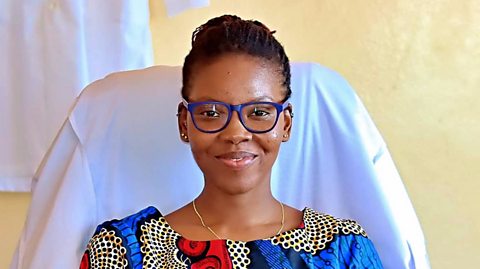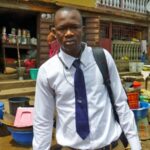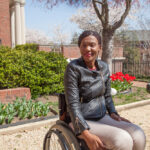Jalikatu is a Sierra Leonean eye doctor and one of only four in the country. Working with global charity, Sightsavers, she never could have imagined how she would reach her goal to become the eye doctor she has become today. This is her story.
“When I was five or six years old the civil war Sierra Leone started. At first, I was lucky in the first few years because we lived in Freetown. We didn’t really get to see a lot of the war that was happening elsewhere. Till it was 1997 when I was 10 years old.”
In 1997, May 25 there was a military coup. The soldiers overthrew the government. “One night we woke up to the sound of blasting gunshots and everybody was panicking; wondering what was going on. My parents woke me up and told me to hide under the mattresses to avoid any stray bullets and to remain safe.”
It only got worse from there for Jalikatu and her family.
It seemed after some days there was a sense of stability but the government’s military formed an alliance with the rebels.
“They invited the revels to Freetown and that’s when everything went bezerk,” Jalikatu interjected.
“On June 1, my parents were really worried because the rebels were getting close to where we lived.” They had attacked people’s homes, stealing properties and even hanging people. “My father’s friend had called and told him about a hotel in Freetown. It was called Marioko Hotel at the time; now it’s a Radisson Blu Hotel.”
“The Marioko was the best hotel at the time,” she remarked.
It turns out Jalikatu’s family has happened to be the safe house of ECOWAS’ ECOMOG, a pan-West African peacekeeping unit mostly made up of Nigerian soldiers for the West African organisation.
“On June 2, the rebels decided to storm the hotel. We basically left our home for a war zone.”
“We were on the fourth floor when the rebels made it to the hotel. They also brought a helicopter which shot RPG rounds at the hotel’s top floors. Then the staff told us to go to the basement. We could feel the building shaking.”
In the basement, for over 24 hours, Jalikatu and her family experienced a dark side of life they could never anticipate.
As they sat in the basement men began to bring in injured ECOMOG soldiers the rebels had targeted from above ground. It was a scary and painful sight; some were terribly injured, bleeding continuously and others were brought dead to the basement.
According to Jalikatu, the older women took clothes from their luggage to use as bandages for the injured men. The children who came with other families sat in a corner and simply gazed in confusion and in shock.
“When morning came, my mother told us ‘no matter what happens, we are all together’ while she held onto us dearly. Everybody thought we were going to be killed.
By some miracle, a man they called General Mosquito in charge of the rebels, came to say, ‘we are here for Nigerian soldiers and not you. So every civilian is free to go.”
Once they got home, Jalikatu’s father received a call from the new coalition government. On the other end of the line, a man offered him a job. The proposed job was to be a Finance Minister in the newly formed government.
Although Jalikatu’s father excelled at being an economist, he did not want the job. To the government though that was highly disrespectful and he knew that.
There were now two options: stay, decline the offer and be killed or simply leave the country.
The family chose the latter.
“We packed all of our stuff and then we went by road to Guinea but there were a lot of checkpoints on the way, making sure nobody left Sierra Leone.”
This was at a time Sierra Leone wanted to create the impression to the international community that the war had settled in the country and life was stable.
“As we got to one of the checkpoints and asked where we were going, my father stepped out of the car and spoke to the soldiers in private. He came back to the car, and the soldiers were saluting him as he walked away from them.”
“I asked why,” Jalikatu said.
He had previously told the man with the job offer, over the phone, that he accepted the offer. But in the grand scheme of things it was a plan to find a safe way out of the country. Jalikatu’s father pretended to accept the position and use his newfound authority to escape Sierra Leone with the excuse that he is taking his children and wife to neighbouring country, Guinea for an education.
Schools in Sierra Leone had been closed for some time due to the ongoing civil war.
All through the other checkpoints the family of the “new Finance Minister” were allowed to pass through with no questions asked. Her father’s plan had worked well.
The family stayed in Guinea for nine months until the Nigerian soldiers went back to Sierra Leone to liberate the city in 1998.
But the relative calm did not last long. The rebels came back just a few months later in June 1999. “This time was much worse because they also came with vengeance,” Jalikatu said. “They were just killing people and this is when they started chopping limbs and burning houses. They were also kidnapping and abducting people.”
“You will see people chopping off limbs right in front of you, people getting killed. I saw everything.”
It got awfully and terribly bad. It also didn’t help that at a point Jalikatu’s family had to move houses to her dad’s friend’s house which was located en route to the government’s military barracks – a hot target for the rebels. To protect themselves from invasion, the military shot at the rebels who always came near the house and the rebels retaliated vice versa.
“It was worse than where we came from. People were being shot in front of me. It was a huge house and huge houses were a target for the rebels because they could amass casualties.”
“My parents were on the brink of giving up and they said, ‘well, if we are going to die, we might as well go back to our own house and die there.”
They all made it back to the house safely but the news elsewhere was grim. Before the rebels were driven out in just a few weeks, 5,000 people had lost their lives. A peace agreement was signed but it was shaky. It’ll be another year or more before stability returned.
In all that time, Jalikatu and her siblings were trying to complete their education, to get the top marks their parents were expecting. They all became doctors. Jalikatu went to Kenya to study ophthalmology but it was a traumatic beginning.
“I got to Kenya the same day as the Westgate Mall incident occurred when the terrorists attacked the mall. I remember when I got to Nairobi, there were so many soldiers in the streets. Everybody was holding guns. I remember thinking it looks exactly like Sierra Leone and I panicked. I literally had a panic attack in the taxi cab that was taking me from the airport to the apartment where I was going to stay.
That’s when I realised for the first time I realised I had post-traumatic stress disorder. My first year in Kenya was really tough because there was a lot of security around because of all the terrorist attacks happening.”
“When I went to places I had a lot of problems with the military having guns. It got better because I got used to them.”
After graduating from university in 2010, she wasn’t sure what she wanted to do.
Then she met a British opthamologist who was working in Sierra Leone at the time. He was one of two opthamologists in the whole country; the other was Sierra Leonean. The British doctor was on a recruiting mission to get young doctors interested in ophthalmology. He was speaking about his work and he said something that stood out for me.
“He was so passionate about ophthalmology and I thought if I am going to do something, I want to do something that makes me passionate about the job.” She decided to check his work out.
“I talked to his patients before and after their surgeries. The fact that many of these people had been blind for years but 10 minutes of surgery their whole lives had changed the next day, by this one person, yes, then this is something I want to do.”
Jalikatu, the Sierra Leonean eye doctor was then offered a very well-paid job in Kenya but declined the offer to stay in Sierra Leone.
“Kenya had over 200 very good ophthalmologists when I had started working in Kenya. But my twin sister who was back in Sierra Leone was getting married. So I flew home expecting to stay two weeks for the wedding. One day during this time, I decided to go to the eye clinic, where I work now, just to see what’s happening. I got there and I was shocked.
There were about 200 patients just there waiting to be seen. There was one ophthalmologist in the whole facility at the time and in fact there were only three in total in the country. Many of these people I knew, that shocked me. Teachers from primary education, or aunties of my friends.”
After much pondering, Jalikatu the Sierra Leonean eye doctor decided to stay in Sierra Leone where she could really make a difference in the lives of people, including the ones she already knew.
“I thought, I am really not needed in Kenya. Here are people I know, over 200 waiting to be seen by one ophthalmologist. I just couldn’t get over it. I just know that I can do so much more here in Sierra Leone than in Kenya,” Jalikatu, the Sierra Leonean eye doctor said.














